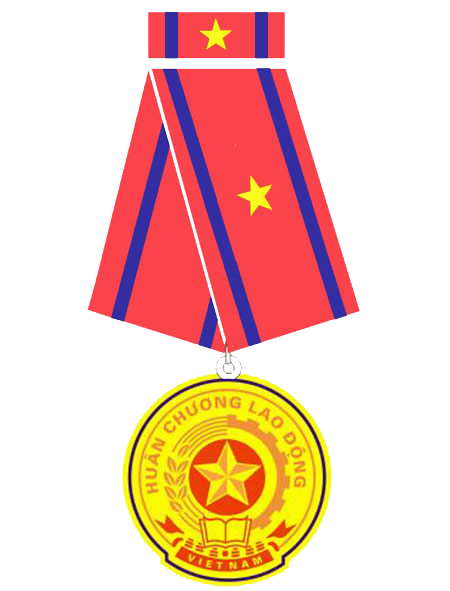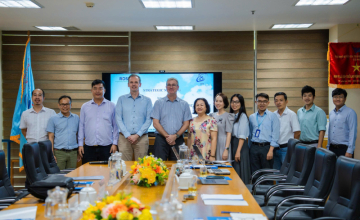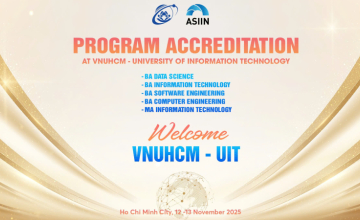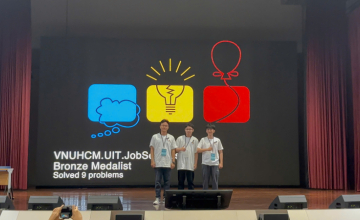In the context of globalization, nations do not only compete in terms of economy, quality of goods and services, but also compete for education. This thing poses a vital requirement for educational institutions to find a place, gain credibility and integrate into global education.
An important element in the quality assurance of training at educational institutions is the quality inspection. The editorial board Of University of Information Technology (UIT), Vietnam National University-Ho Chi Minh City (VNU-HCM) had a talk with MSc Trinh Thi My Hien, - Head of Office of Inspections, Legality and Quality Assurance about this issue
*Dear Ms. Trinh Thi My Hien, Could you tell us some common problems in accreditation of higher education today?
Accreditation of education has long been established and developed in the United States and North America. Today, this activity is increasingly popular because it is an effective tool that helps schools control and assure the quality of training to improve their competitiveness.
According to CHEA, "Accreditation is an external quality review process that is used by higher education to examine and evaluate the education and training to ensure and improve quality. "
In Vietnam, the concept of "accreditation" is included in the 2005 Education Law for the first time, "Accreditation of education is a key measure to determine the level of performance of a program, its objectives, its content Education for schools and other educational institutions. The quality assurance of education shall be conducted periodically throughout the country and for each educational establishment. The results of the quality inspection of education are publicly available to the public and monitored "(Art. 17, Education Law).
In 2007, Ministry of Education and Training issued regulations and specific guidelines for use as a tool for assessment and accreditation. In May 2013, the Department of Educational Testing and Accreditation of the Ministry of Education and Training issued Document No. 462 (on process) and Document No. 527 (on criteria) marking the completion of the transfer process of MOET's assessment methods for universities across the country are prepared for comprehensive quality assurance.
Since then, the quality assurance of educational institutions in Vietnam has been strongly developed. MOET issues an accreditation plan with the objective that by 2020 all universities nationwide should be accredited. By March in 2017, according to statistical results of 4 testing centers under the following organizations: VNU-Hanoi, VNU-HCM, Da Nang University and Association of Colleges of Vietnam, 22 colleges have been certified as accredited by the Ministry of Education and Training.
In addition, MOET is applying AUN-QA accreditation standards and is currently implementing a pilot AUN-QA benchmarking standard with 25 standards, 111 criteria.
*So how does quality assurance work for universities?
Accreditation of education has four major roles.
Firstly, the quality assurance of education gives universities the opportunity to review their activities in a systematic manner so that they can adapt their activities to a certain standard. There are many different views on quality such as: quality is assessed by inputs, output or value added. However, to accurately assess the quality of a university, we can not just look at one aspect of the quality of the input or output, but rather the overall view of the universityl's performance. It is the role of the accreditation, the accreditation itself will not produce quality for every university, but it is the mirror that reflects the whole of the university, which helps heads recognize the strengths, weaknesses of their units from which to take appropriate steps of action.
Secondly, quality assurance helps universities orient and define quality standards for each activity. Quality standards were first identified by MOET in 2007 (Decision 65/2007 / QĐ- BGDDT dated November 1, 2007) is a set of 10 standards with 61 criteria and specific indicators that university needs to achieve to ensure total quality. The analysis, description of the situation, finding strengths and weaknesses, concurrently planning action, solutions to address these shortcomings are the development orientations for the next stage of the universities.
Thirdly, quality assurance education is a strong statement to the stakeholders about the quality of the university. Firstly, the voluntary registration of accreditation is considered a commitment to the quality of training that the university brings to the learner and other stakeholders such as employers, partners, society. In addition, external evaluations are conducted through third parties who are experienced professionals in the training, research and management of higher education, certified auditor training and / or card Quality assurance auditors will be highly objective in recognizing the quality of the school. Therefore, the results of the test provide the stakeholders with timely and accurate information to confirm the quality of the training of the school so that they can choose the appropriate services.
Fourthly, quality assurance education creates the premise of building quality culture for educational institutions. Quality assurance activities are based on indicators and standards for evaluation, so, this information helps each member of the school to better understand their work and those of their peers as to how they are qualified so that they can actively improve their quality of work and contribute to the relevant persons how to get the quality, together with related person take actions following the quality, then quality culture will gradually set at academic institution.
*What difficulties in implementation of quality accreditation work?
Accreditation of education plays a very important role in the development of the school and society, but in the process of implementing this work, the schools face some difficulties such as:
Firstly, there is lack of commitment the school leaders. Internal quality assurance in general and quality assurance in education in particular is a long-term process, requiring the participation of all staffs and students. Practice shows that, if leaders have the right awareness, real interest, investment effort, direct guidance, the school's accreditation can be implemented properly and effectively. The commitment to implementation will also motivate the collective towards the goal of improving the quality of training and service of the school. However, many managers are not fully aware of the importance of the accreditation so it is very difficult to carry out this task.
Secondly, the perception of staffs and students about the quality assurance of education is not high. To present, quality assurance has not been a new issue in Vietnam, but implementation to all stakeholders in the school is still ineffective. Many lecturers, students, employers have not fully understood the role, effect and content of quality accreditation. This lack of knowledge is mainly due to the propaganda and promotion, and the activities of self-assessment and evaluation are mainly carried out by a few specialized units, which have not really become regular activities in order to make the information easily accessible to the objects concerned.
Thirdly, there is lack of experience in implementation, writing self-assessment report to conduct quality accreditation. Most of the members of the self-assessment board are administrators in charge of a variety of tasks in the school, so there is less time is spent on self-assessment. In addition, the task force writing self-assessment reports is inexperienced, not trained in the collection techniques, information processing, and demonstration. There is lack of coordination between task forces during self-assessment, joint discussions between task forces, between task forces and self-assessment committees. These make it difficult for quality assurance experts to assess the majority of the results through the school self-assessment report.
Fourthly, there is difficulty in collecting, using, managing evidence for self-assessment. It can be said that collecting and analyzing evidence is difficult for all schools. The reason is that storage is not good. For example, it is not a habit to keep records of meeting meetings or dissemination of work, especially many data that are not recorded in the tables so that the assessment team can easily follow and evaluate the change of school and trends, development in the coming time.
*With the UIT in individually, how is the quality of education evaluation?
Implementing the guideline of MOET and VNU-HCM on the roadmap for accreditation of education quality, UIT has implemented the self-assessment of educational institutions based on the Regulation on quality assessment criteria Unified University No. 06 / VBHN-BGDDT dated March 03, 2004 unifying Decision No. 65/2007 / QD-BGDDT dated 01 November 2007 of the Minister of Education and Training, as amended in Circular No. 37/2012 / QD-BGDDT dated October 30, 2012 of the Minister of Education and Training.
The UIT conducted self-assessment firstly in May 2010. Based on this self-assessment, UIT has planned and implemented improvements. After the first improvement, the UIT updated its self-assessment report and was evaluated internally by VNU-HCM in 2012. The results show that UIT has a lot of problems to improve quality and the UIT has planned, determined to implement.
In October 2015, UIT conducted a review and mid-term evaluation, evaluated by the Center for Educational Quality Assessment of VNU-HCM, the results of the evaluation showed that the University has made great progress compared with year 2012, most of the unsatisfactory content has been overcome. Therefore, the University basically meets the Ministry of Education's quality assurance standards and is eligible for external assessment for recognition of quality standards.
UIT continues to refine the self-assessment report and database system, demonstrating online. From 29/10 to 02/11/2016, the University performs quality accreditation by the General Statistics Office of Vietnam National University Hanoi.
On preparation for quality inspection
Before the 1-month verification period, UIT plans to host the Delegation of Experts by setting up four sub-committees. Each subcommittee consists of 5 to 7 members, acting as a contact point for coordinating tasks. Sub-committees operate under the direction of the Steering Committee (composed of the Board of President and the heads of the relevant units). Including:
- Content Subcommittee is in charge of the entire database, information and evidence provided to the External Assessemnt Team.
- The logistics committee has the task of communicating, paying for the procedures and contracts with the VNU, Hanoi, and is responsible for preparing the bandrolls, backdrop, posting photos, logistics such as eating and drinking, take off, take the outside the assessment team.
- The contact, coordination, and gift sub-committee is responsible for the contact, making lists of interviewees inside and outside the school, preparing the interviewees, coordinating interviews. In addition, the subcommittee also coordinated with the Office of Inspection - Legislation - Quality Assurance to meet and exchange information with interviewees, helping them to better understand the self-assessment and verification of UIT.
- Sub-committee of material facilities is responsible for inspecting facilities for teaching, scientific research, working offices; arranging working rooms, interview rooms, working facilities of the external evaluation team, ensuring the equipment to operate well; Guide the delegation to visit the facilities inside and outside the school.
The establishment of subcommittees helped the Board of President oversee the whole operation and have a basis for evaluating the effectiveness of each task. Accordingly, the head of each sub-committee plans, assigns work to each member and supervises and monitors progress. The head of the Sub-committee is responsible for reporting to the Steering Committee on the status of work implementation weekly and report the completion of work before the three-day survey.
With the spirit of the Board of President thoroughly and the whole school together to support the evaluation team outside, during the inspection of the school, the committee in particular and the entire staff members successfully completed the task. , create satisfaction and sympathy from the external assessment team.
On the reception of the external assessment team
It is important to affirm that quality assurance is not an inspection to find faults in the school, but assessors as quality ambassadors recognize the strengths and weaknesses of the school to identify the next action plan to maintain and improve quality.
Accreditation program of the UIT takes place within 5 days with activities such as document study, demonstration, self-assessment report; interviews with related subjects; contact and work with the school leadership team; visiting the facilities and equipment of the school.
In general, the test at the school is quite convenient. Auditors have a friendly attitude in the work process, especially when interacting with the interviewees, the evaluation team always creates an atmosphere of openness and harmony so that the subjects can express their opinions in the most comfortable.
On the UIT side, during the inspection period, the Office of Inspection - Legislation - Quality Assurance is a direct contact point between the University, the sub-committees and the assessment team, which is responsible for communicating the requirements of the delegation to related parties to carry out the related work.
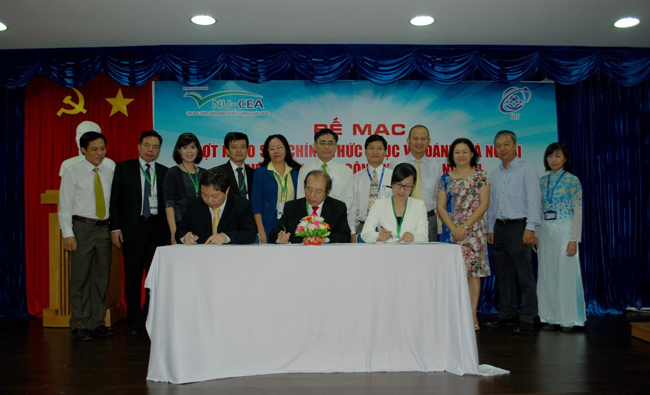
VNU-CEA leaders and UIT President signed the minutes of the survey
*And how did the IT University achieve its results?
With the efforts, determination to innovate and constantly improve the quality of training services, results of the test has reached 51/61 evaluation criteria (accounting for 83.60%). With this result, the school has been accredited by the Quality Assurance Accreditation Council of the Hanoi Central High School for the Accreditation of Educational Quality (according to Decision No. 36 / QĐ-KĐCL dated April 12).
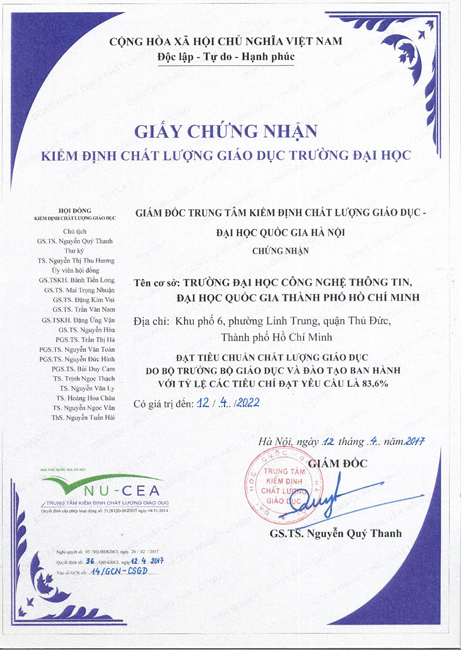
Certificate of accreditation of UIT
This result is a milestone marking the development of the University in 10 years of establishment, which is the result of the efforts and efforts of all staff in the first stage of development; it contributes to raise the awareness of the quality assurance of staffs and teachers, and is an important lever to help the University improve and improve the quality of education towards regional and international quality standards.
The results of accreditation are also important for the school to explain to the Ministry of Education and Training about the quality of training and service; enhancing the status and image of the school helps learners and employers have more facilities to choose learning and cooperation.
With a vision to 2030, UIT has become a prestigious university in ICT and related fields in Asia, ensuring continuous improvement of training and research quality. Science is a very important issue. The benefits of quality accreditation are enormous.
Besides reviewing and assessing the quality of education of the school, the University has set up a development roadmap for the period 2016-2021 with basic objectives such as diversification of training disciplines, focusing on research key focus and technology transfer. In addition, the school also promotes and develops the school's brand, develops strategic partners and progresses to financial autonomy to actively develop plans and improve the system of information technology infrastructure and facilities.
Thank you very much!

